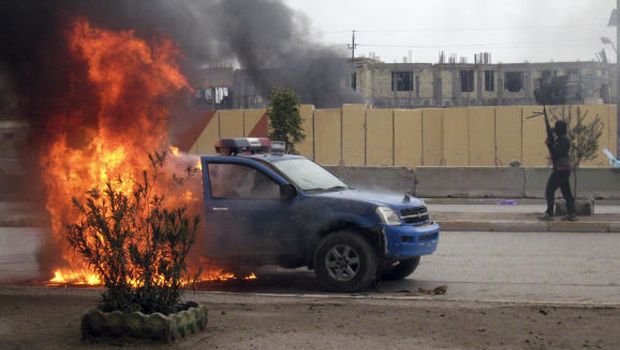
In this Wednesday, January 1, 2014, file photo, an insurgent stands guard after setting fire to an Iraqi police truck in front of the provincial government headquarters in Fallujah, Iraq. (AP Photo, File)
Baghdad, Asharq Al-Awsat—The United Nations on Thursday expressed concern over the plight of civilians caught up in the fighting in Fallujah as Iraqi Prime Minister Nuri Al-Maliki faced criticism at home for the ongoing conflict in the country’s western Anbar province.
UN mission chief to Iraq, Nickolay Mladenov, issued a public statement saying: “I am particularly concerned about the rapidly deteriorating conditions in Fallujah where many residents are caught up in the fighting,” adding that “the UN continues to urge for humanitarian access to the city.”
The UN statement follows an Iraqi government decision to seek to integrate Anbar tribesmen fighting against Islamic State of Iraq and Syria (ISIS) fighters into the military and police forces. In his weekly press conference on Wednesday, Maliki acknowledged that the “terrorists” were creating their own arms and weapons in some districts of Fallujah, adding that government forces were continuing to besiege the city.
“Fallujah is being besieged by security services to prevent the terrorists based there from communicating with those outside the city . . . and some former officers with experience in producing weapons are doing so there, and these weapons are being used against the Iraqi people and security forces,” Maliki said.
“These neighborhoods are being targeted by the security forces as they are absent of civilians, and only these criminals and killers are present there,” he added.
Maliki announced the restructuring of the Anbar special police force to include the “honorable” Anbar tribesmen fighting against ISIS, saying: “They will be a vital part in the development of the armed and police forces in Anbar.”
Fares Ibrahim, a member of the Iraqi Awakening Council—or Sons of Iraq—in Anbar province, praised Maliki’s latest decision to integrate the Anbar tribesman into the police and military. He told Asharq Al-Awsat: “The plan announced by the prime minister comes in response to the plans agreed by the local government and Anbar tribes. Implementing this plan of action will have a profound affect in securing huge advances in the war against terrorism in this province.”
However the Mutahidoun Coalition, led by Iraqi Parliamentary Speaker Osama Al-Nujaifi, criticized the Iraqi prime minister this week, saying he was not serious about resolving the conflict in Anbar.
Mutahadoun issued a statement on Wednesday stressing that Al-Qaeda and ISIS must be confronted across Iraq, not just in Anbar. The statement read: “There is no alternative to a political solution that accommodates the legitimate rights of the citizens [of Anbar] and makes them the tip of the spear in terms of confronting terrorism.”
The statement added: “Many initiatives have been put forward, but these have not been dealt with seriously enough, and this has resulted in Anbar citizens strongly feeling that the government is not serious about resolving the crisis.”
